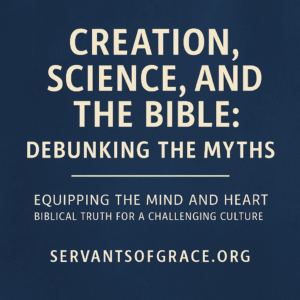⏱️ Estimated Reading Time: 12 min read
As we saw in Philippians 2:1-4, Christians are called to be humble and serve one another. Paul even exhorts the church to “make my joy complete by being of the same mind, maintaining the same love, united in spirit, intent on one purpose” (v. 2). In other words, to manifest unity. And the basis of Christian unity is found in how we regard one another—considering them to be more important than ourselves (v. 3). But how is this to be done? What does true humility look like? Well, we find the foremost example in the Lord Jesus Christ.
Paul seizes on the Person of Jesus as being the epitome of humility by juxtaposing His great descent from heaven to earth. In fact, the Incarnation of Jesus Christ is the very model by which all humility is to be measured. How so? Paul elucidates:
- Despite being God, Jesus did not consider it His position (v. 6).
- He “emptied Himself” by taking on humanhood (v. 7).
- He humbled Himself in obedience, unto death (v. 8).
- His humility found its end by dying in the most despised way—on a cross (v. 8).
However, one thing, in particular, has challenged Christian theologians for centuries. How exactly did Jesus “empty Himself” (v. 7), and what does it mean for those who are to follow His example? But, in order to address that question, we need to first consider the dual nature of Jesus Christ.
Jesus as God
Despite the vast number of miracles performed by Christ, there were inherent claims made regarding His divinity. For example, in Mark 2:7, the Pharisees ask “who can forgive sins but God alone?” The ensuing verses catalog Jesus’ response by tying together the forgiveness of sin with the healing of a lame man. He does this “in order that [they] may know that the Son of Man has authority on earth to forgive sin” (Mark 2:10). Since Jesus Christ affirms that He has authority to forgive sins, and the Pharisees state that only God can forgive sins, therefore, Jesus is God.
In John 10:30, Jesus proclaims equality with God; “I and the Father are one.” Earlier, in John 8:58, Jesus claims the Name of God; “before Abraham was born, I am.” In Mark 14:62, Jesus claims to be “the Son of the Blessed One,” fulfilling Daniel 7:13. Jesus also receives worship (Matt 28:17), which is rightfully to be reserved for God alone. Perhaps one of the greatest and most telling proclamations is done by Thomas, in John 20:28, when he proclaims “My Lord and My God!”
Jesus as Man
Jesus of Nazareth lived on this earth as a Man. He hungered (Matt. 4:2), wept (John 11:35), became tired and slept (Mark 4:38), experienced distress (Matt. 26:37-38), and suffered and died (Matt. 27:50; Mark 15:37; Luke 23:46; John 19:30). There is nothing in Scripture to indicate that Christ lived a life anything different from any other human, with one exception—He did not sin (John 8:46; 2 Cor. 5:21; 1 Pet 2:22; Heb. 4:15). Jesus’ life was the perfect example of a human life; the model for all humanity. Whereas Adam was the first and fell to sin, Christ is the second Adam and lived sinless unto glory (Rom 5:12-21). Ultimately, one of the greatest purposes of Christ’s life on earth was to establish Himself as the icon of humanity, while existing as the perfect propitiatory sacrifice for sin (cf. Heb. 4:15). There cannot be any question as to the absolute humanity of Jesus Christ during the Incarnation.
The Mystery of the Incarnation
While, the discourse in Philippians 2:5-8 is an exploration into the mystery of the Incarnation, it is verse 7 that most challenges our understanding. Again, Philippians 2 tackles the true dual identity of Christ as God and man. Verse 6 speaks to the preexistence of Christ, as well as the equality with God. But the true thrust of the passage, however, centers on one specific attribute possessed by Christ during the Incarnation—humility. Verse 8 specifically tells us that Jesus “humbled Himself… to the point of death.” Somehow, the Second Person of the Trinity passes from preexistent glory into absolute humility in the Incarnation. How did this happen? How could this happen? What does this do to His attributes? Is there a change being made? After all, verse 8 says that Christ “became” obedient. There is some sort of transition occurring here. But how are we to understand the implications of the abject humility of the greatest One in history? Many scholars have wrestled with a doctrine known as “The Kenosis.”
The Doctrine of Kenosis
The term “kenosis” comes from the main verb in Philippians 2:7, ekenosen, and is rendered “emptied Himself” in most popular translations. In essence, the argument for “kenosis” is that at His coming, the Second Person of the Trinity gave up certain aspects of His deity in order to live on earth. Wayne Grudem writes:
“The kenosis theory holds that Christ gave up some of his divine attributes while he was on earth as a man… According to the theory, Christ ‘emptied himself’ of some of his divine attributes, such as omniscience, omnipresence, and omnipotence, while he was on earth as a man. This was viewed as a voluntary self-limitation on Christ’s part, which he carried out in order to fulfill his work of redemption.”[1]
However, this presents immense theological problems, especially in light of the fact that no one had understood the verse this way in over 1,800 years of church history! Part of the problem lies in the English translation of the word. Charles C. Ryrie writes:
“’Emptied’ may be a misleading translation because it connotes Christ’s giving up or losing some of His divine attributes during His earthly life, and that was not the case. Therefore, kenosis cannot be understood to mean a subtraction of deity but an addition of humanity with its consequent limitations… Choosing not to use His divine attributes is quite different from saying that He gave them up. Nonuse does not mean subtraction.”[2]
This simple phrase, “emptied Himself” carries with it the potentiality of dangerous implications on the full deity of Jesus Christ. The absolute deity of the God-Man is essential because of salvation. To this end, L.S. Chafer explains:
“[I]n becoming flesh He, though laying aside His glory, in no sense laid aside His deity. In His incarnation, He retained every essential attribute of deity. His full deity and complete humanity are essential to His work on the cross. If He were not a man, He could not die; if He were not God, His death would not have had infinite value.”[3]
If in the Incarnation of Jesus Christ, He changed or altered His very person, character, or being, then He could not be the expiation of sin required for the salvation of mankind. So then, how are we to explain an “emptying” of certain qualities? The very essence of the faithfulness of God and His character is at stake.
The issue at hand does not seem to be that the term “emptied Himself” is fallacious, rather, perhaps the understanding and translation. In looking deeper, we see that this word, ekenosen, is used figuratively in Scripture, and means “to make void,” “of no effect,” “of no account,” even “of no reputation.” Jesus Christ, then, can be understood to be “emptying Himself” in a figurative sense, of His glory while on earth. John Stott addresses the dire consequences if God were to truly “empty Himself” of deity:
“He can empty himself of his rightful glory and humble himself to serve. Indeed, it is precisely this that he has done in Christ (Phil 2:7-8). But he cannot repudiate any part of himself because he is perfect. He cannot contradict himself. This is his integrity… He is always himself and never inconsistent. If he were ever to behave ‘uncharacteristically,’ in a way that is out of character with himself, he would cease to be God and the world would be thrown into moral confusion. No, God is God; he never deviates one iota, even one tiny hair’s breadth, from being entirely himself.”[4]
God must be God. And if we continue to proclaim Jesus as God, then Jesus must be fully God as well. This simple fact about Christ bears incredible weight on the text of Philippians 2:7. While we understand that God will not contradict Himself in Scripture, we can approach the text confidently that God is not changing or diminishing. How then are we to understand the implications of the Incarnation? Does Philippians 2:5-8 help us in our further construction of an understanding of Christ on earth? On the Incarnation of Christ, John Calvin writes:
“When it is said that the Word was made flesh, we must not understand it as if he were either changed into flesh, or confusedly intermingled with flesh, but that he made choice of the Virgin’s womb as a temple in which he might dwell. He who was the Son of God became the Son of man, not by confusion of substance, but by unity of person. For we maintain, that the divinity was so conjoined and united with humanity, that the entire properties of each nature remain entire, and yet the two natures constitute only one Christ.”[5]
What can we conclude the text is saying about the Incarnation? How is Jesus Christ “humbling Himself” by “emptying Himself?” It seems to lie in the phrase, “taking the form of a bond-servant.” Ralph Martin explains:
“As he did not clutch at equality with his Father he perforce accepted the consequences of this renunciation. But made himself nothing, which is, more literally, ‘but emptied himself’, heauton ekenosen—a phrase which has given its name to the so-called ‘kenosis’ theory of the incarnation – is best interpreted in the light of the words which immediately follow. It will then refer to the ‘pre-incarnate renunciation coincident with the act of ‘taking the form of a servant’’, and this reading of the text stands over against the original ‘kenotic’ idea that in becoming man he divested himself of the relative attributes of deity, viz. omniscience, omnipotence and omnipresence, and ever suffered the extinction of his eternal self-conscience. The present verse says nothing about such things, but rather teaches that his ‘kenosis’ or self-emptying was his taking the servant’s form, and this involved the necessary limitations of his glory which he laid aside in order that he might be born in human likeness.”[6]
In taking on the form of humanity, Jesus Christ could not have altered His state of deity, as He is immutable. According to John Walvoord, “it may be stated that the humiliation of Christ consisted in the veiling of His preincarnate glory. It was necessary to give up the outer appearance of God in order to take upon Himself the form of Man.”[7] Jesus could not have been beheld had He remained in His glorified form while on earth.
If Christ did not surrender any portion of His divine Person, then what was He giving up? Grudem concludes, “the best understanding of this passage is that it talks about Jesus giving up the status and privilege that was his in heaven: he ‘did not count equality with God a thing to be grasped’ (or ‘clung to for his own advantage’) but ‘emptied himself’ or ‘humbled himself’ for our sake, and came to live as a man.”[8] The text seems to imply an addition, which taken in light of Christ’s already-complete perfection, would be the essence of humility—an emptying of sorts. On this concept, Homer A. Kent Jr. writes, “The word ‘taking’ (labon) does not imply an exchange, but rather an addition. The ‘form of God’ could not be relinquished, for God cannot cease to be God; but our Lord could and did take on the very form of a lowly servant when he entered human life by the Incarnation.”[9]
Even further, Michael J. Gorman writes, “[The verse], therefore, does not mean Christ’s emptying himself of his divinity (or of anything else) but rather Christ’s exercising his divinity, his equality with God.”[10] In order to save humanity, Jesus had to do what none other had the power to do—take the humble form of human flesh and wrap it around His glorious Deity.
How Then Must We Be Humble?
If we are to correctly understand the consequences of the Incarnation—the taking on of the likeness of sinful flesh, yet without sin—then we must stand in awe of such an act. Often times, Christian believers marvel at the Cross only, without considering Jesus Christ’s preemptive step in becoming human, to begin with. While some have called Christ’s Atonement “cosmic child abuse,” the Incarnation and Atonement could not be farther from it.
The coming and dying of Jesus Christ for the forgiveness of sin was long pre-meditated and intentional. To approach this truth, one must humble themselves and manifest worship, adoration, holy fear, and abject awe. Philippians 2:5-8 should elicit an obedient desire in the life of the believer.
And, in beholding the breathtaking sacrifice of Christ to come and live in abject humility, we are ourselves motivated to imitate our Lord. We don’t count our own status or position as something important. We maintain a humble attitude; we think humble thoughts. We consider others as more important than ourselves. We give preference to others first. We live to make little of ourselves and much of God in Christ Jesus.
After all, if “God is opposed to the proud but gives grace to the humble,” then would not Christ, in the incarnation of humility, undertake the epitome of humiliation?
He would.
He did.
[1] Wayne Grudem, Systematic Theology (Grand Rapids, MI: Zondervan, 1994), 550.
[2] Charles C. Ryrie, A Survey of Bible Doctrine (Chicago: Moody, 1972), 58-59
[3] Lewis Sperry Chafer, Major Bible Themes, (Grand Rapids, MI: Zondervan, 1974), 56.
[4] John R. W. Stott, The Cross of Christ, (Downers Grove: IVP, 1986), 128-129
[5] John Calvin, Institutes of the Christian Religion (Translated by Henry Beveridge. Peabody, MA: Hendrickson, 2008), 309.
[6] Ralph P. Martin, Philippians: An Introduction and Commentary (TNTC) (Downers Grove: IVP, 1987), 108-109
[7] John F. Walvoord, Jesus Christ Our Lord (Chicago: Moody Press, 1969), 143
[8] Grudem, Systematic Theology, 550-551
[9] Homer A. Kent, Jr. “Philippians” in The Expositor’s Bible Commentary (Grand Rapids: Zondervan, 1981), 123-124
[10] Michael J. Gorman, “‘Although/Because He Was in the Form of God’: The Theological Significance of Paul’s Master Story (Phil 2:6-11)” in Journal of Theological Interpretation 1.2 (2007) 162.



